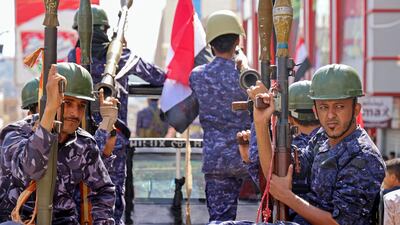Yemen must be unified, with all parties working together to secure peace, a former foreign minister of the country has said.
Abu Bakr Al Qirbi, who held the role in the years before the conflict began in 2015, told The National that a peace deal had to be secured and institutions rebuilt before any conversation about power sharing could take place.
“What’s important now is to get Yemen out of this mess by resolving the conflict, building the state and a functioning parliament. Without that it is futile to talk about separation or anything else,” he said.
“There should be the full participation of all players, ensuring that there is going to be a sharing of power and wealth, and building of government structures based on the peaceful transfer of power.
“Let us save Yemen first for all of us. We cannot share Yemen before saving it.”
Mr Al Qirbi met with British ministers on Wednesday as part of a series of forums aimed at reviving the UK's support for resolving the conflict, now in its seventh year.
His comments come as Saudi Arabia negotiates with the Iran-backed Houthis about a potential peace deal. But these talks have faced challenges, with the Houthi approach said to be stalling progress.
Yemen’s other parties to the conflict, including the UN-backed government, have felt sidelined by these negotiations. The Southern Transitional Council, a group that is part of the internationally recognised government, renewed its calls for an “inclusive” peace deal on Wednesday.
Mr Al Qirbi echoed these demands, which he said were necessary to achieving lasting peace.
“I would like to see more transparency from the negotiations. It should resolve the Yemen situation in a comprehensive manner, and not a fragmented way. Ensuring that the interests of all are taken into consideration, protecting Yemen’s sovereignty and unity,” he said.
Yemen has entered its second year of a de facto truce between the Houthi rebels and the UN-backed government, which is known as the Presidential Leadership Council. But the ceasefire is fragile. “There are signs that the Houthis are growing restless,” Mr Al Qirbi said.

The STC is also calling for an overhaul of the PLC, and a partitioning of Yemen that would concede the north to Houthi control while maintaining independence for the country’s south.
Weeks earlier, Aidaroos Al Zoubaidy, the leader of Yemen's southern movement, held meetings in the UK where he committed to holding an independence referendum that could lead to the country being partitioned.
The cash-strapped Houthis, who are unable to pay their civil servants, have threatened PLC-controlled oil terminals in what the UN-backed government has described as an “economic war”.
While Mr Al Qirbi acknowledged that the conflict had become a “lower priority” for western countries, he had “great expectations” that the UK could play a bigger role in achieving peace in Yemen.
The UK and US joined a Saudi-led coalition against the Houthis when the war began in 2015, but have since withdrawn.
“The UK has a long history in Yemen and southern Yemen in particular. Therefore they feel they have a responsibility to play in helping to resolve the conflict,” Mr Al Qirbi said.
The UK’s role as penholder of the UN Security Council and its relationship with the US gave it the power to “influence” outcomes in Yemen. “But they’ve been very much preoccupied with their internal politics in the last two years,” he added.
Resolving the conflict in Yemen had important security implications, Mr Al Qirbi said.
“Yemenis will have no difficulty in dealing with the issue of terrorism, as part of a comprehensive solution for the conflict in Yemen, you cannot separate the solution for the conflict from fighting terrorism,” he told MPs on Wednesday.
Peace was also the only road to ending Yemen’s humanitarian “catastrophe”, which has seen extreme poverty, food and electricity shortages. “This will not end with more humanitarian aid. It will only end by resolving the conflict,” he said.
Mr Al Qirbi praised the US’s recent attempts to restore its “traditional” relations with Saudi Arabia, after a period of near hostility. In its first weeks in office, President Joe Biden's administration reversed the designation of the Houthi’s as a terrorist group, a move that angered Riyadh.
“In the beginning of Mr Biden’s presidency, the US promised that they will be more actively involved in reaching a solution to the conflict. Unfortunately they have not, and in some ways they complicated it,” he said.
“There are signs that they are trying to recover from this disastrous confrontation, and hopefully that’s a return to initiating comprehensive negotiations.”
Mr Al Qirbi criticised the UN’s “lack of progress” on Yemen and called for its role to be revised.
He also lamented the “very fragile position” of the PLC, whose members have been at loggerheads about the future of the country. “The PLC needs a lot of debate about its legitimacy, constitutionality and many other questions. If they persist in this manner they will lose the ability to achieve anything,” he said.
More unity in the internationally recognised government’s tackling of issues around governance and corruption, was needed, Mr Al Qirbi said.
“The differences between the eight members of the PLC are creating more problems than the war itself, and this has to be addressed,” he said.


